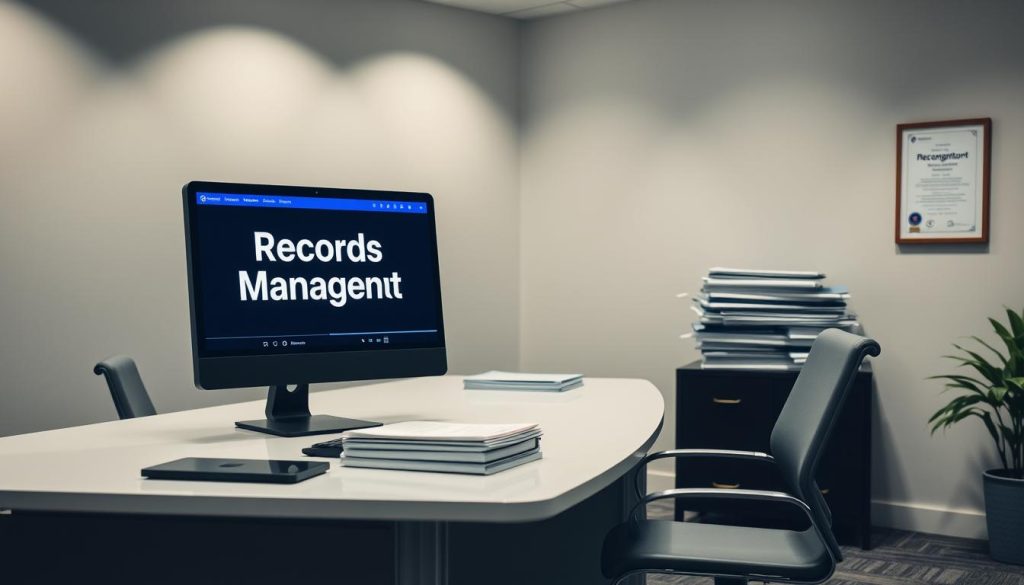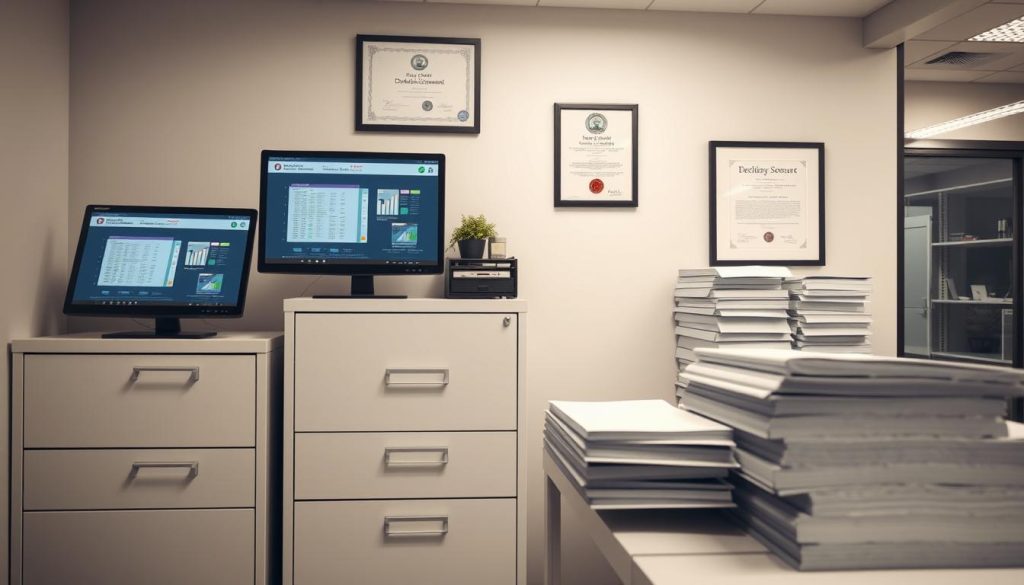ICRM (Institute of Certified Records Manager) Test Guide
Records management and information governance can seem overwhelming. But getting the ICRM (Institute of Certified Records Manager) certification can change your career. This guide will help you understand the ICRM test and prepare for it.
The ICRM certification shows you know how to manage and keep records safe. It’s recognized worldwide. Getting certified can open new doors and make you more respected in your field.

Key Takeaways
- Understand the ICRM exam structure and key testing areas
- Gain insights into effective study strategies and reliable resources
- Develop a comprehensive understanding of information governance principles
- Demonstrate expertise in compliance, data security, and risk mitigation
- Enhance your career prospects and stand out in the records management field
This ICRM test guide is for everyone in records management. It’s perfect for both newbies and experienced professionals. Start your journey to success in information governance today.
Mastering Records Management Certification
Starting your journey to become a certified records manager can be very rewarding. The Institute of Certified Records Managers (ICRM) exam is a top test that shows you know your stuff. To do well, you need to know the exam layout and how to prepare.
Understanding the ICRM Exam Structure
The ICRM exam has six parts, each covering a key area of records management. You’ll need to show you’re good at things like records retention, legal compliance, digital archives, document lifecycle management, and compliance regulations. Getting to know the exam’s main topics is a big first step.
Preparing for the Exam: Study Resources
Getting ready for the ICRM exam is crucial. Use many study tools to improve your skills, including:
- ICRM’s official study materials and practice exams
- Industry-specific publications and online courses on electronic records systems, data security protocols, and digital archiving strategies
- Networking with experienced records management professionals to gain insights and best practices
- Participating in industry events and webinars to stay up-to-date on the latest trends and regulations
By putting in the time and effort to study well, you can boost your chances of passing. This will show you’re an expert in records lifecycle management and information governance.

ICRM (Institute of Certified Records Manager) Test
Demonstrating Expertise in Information Governance
The ICRM (Institute of Certified Records Manager) test is a tough test. It checks if someone knows a lot about managing records and information. It shows they can handle documents from start to finish, follow rules, and reduce risks.
To pass the ICRM test, you need to know a lot. You must understand important skills like:
- Creating and using good records management plans
- Keeping data safe and private
- Following laws and standards
- Managing the life of documents well
- Protecting important information from harm
The ICRM exam tests many areas of information governance. It makes sure candidates are experts in:
- Records and information management basics
- Keeping digital and electronic records
- Following rules and laws
- Keeping information safe and private
- Handling and getting rid of records
Getting the ICRM certification shows you’re serious about records management. It makes you a key person in keeping data safe, following rules, and managing risks in your company.

Embracing Compliance and Data Security
Getting the ICRM (Institute of Certified Records Manager) certification shows you know how to keep your organization safe. It teaches you how to manage documents well, set up good retention policies, and follow the latest rules.
As a certified records manager, you’ll help protect your company’s sensitive info. You’ll learn about records retention, legal compliance, and digital archives. This way, your organization will meet top compliance regulations.
With the ICRM certification, you’ll be key in setting up and managing electronic records systems and data security protocols. Your skills in digital archiving strategies and records lifecycle management will help create strong info governance plans. These plans will keep your organization’s important data safe and follow strict industry standards.
Conclusion
The Institute of Certified Records Managers (ICRM) is a professional organization that offers certification for individuals specializing in records and information management (RIM). The ICRM’s Certified Records Manager (CRM) designation is a globally recognized certification that demonstrates expertise in managing records throughout their lifecycle, from creation and maintenance to preservation and disposition. CRMs are skilled in ensuring compliance with legal, regulatory, and organizational requirements, protecting sensitive information, and supporting effective decision-making through efficient recordkeeping practices.
Earning the CRM certification involves passing a series of rigorous exams covering various aspects of records management, including legal considerations, technology, and best practices. This certification enhances career prospects and credibility for professionals in fields such as archives management, information governance, and corporate compliance, and is considered a benchmark for excellence in the RIM profession.
FAQ
What is the ICRM (Institute of Certified Records Manager) test?
The ICRM test is a top certification for records management. It checks if you know how to manage records and follow rules. It shows you’re good at handling digital and physical records.
What are the benefits of obtaining the ICRM certification?
Getting the ICRM certification has many perks. It boosts your credibility and shows you’re serious about learning. It also opens up more job chances and helps you follow rules better.
It makes you better at managing records from start to finish. This is key for keeping your work safe and organized.
How can I prepare for the ICRM test?
To get ready for the ICRM test, start by learning about the exam. Then, study the main topics it covers. Use approved study materials and practice tests.
Learn about the best ways to manage records and follow rules. Practice solving real problems. Get help from experts or your work’s training.
What topics are covered in the ICRM test?
The ICRM test checks your skills in several areas. It looks at managing records, following rules, and keeping data safe. It also covers digital storage and how to manage documents.
It tests your knowledge of information governance and best practices.
How can the ICRM certification benefit my organization?
The ICRM certification helps your company in many ways. It makes sure you follow laws and rules. It also makes your records management better and safer.
It helps avoid problems with data and rules. It makes your data protection stronger. It also improves how you manage digital and physical records.